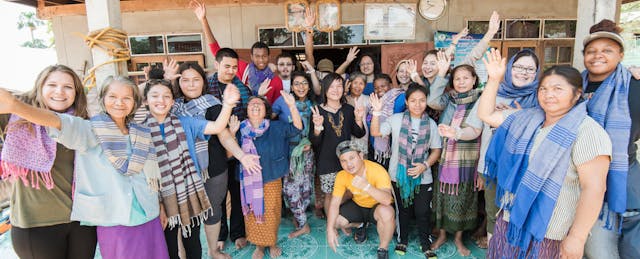The school year has already begun, and Principal India Hui only has 12 students. She spent the entire summer recruiting, but convincing parents to let their kids be a part of her school’s unique and unfamiliar model—which includes flying the students to Thailand and Laos for several months for a study-abroad program—is more difficult than it seems.
“I had one girl who was like, ‘black people don’t fly,’ so yeah, it's has been the struggle,” Hui says, “but I am getting through to families.”
Hui, the principal of Thrival World Academy, in Indianapolis, has been recruiting juniors from Arsenal Technical High School (where her school is housed) to be part of her charter. Students in the charter school spend the first half of the year in Indiana and the second half abroad.
“People aren't familiar with it, and parents are really hesitant,” says Hui. “Especially in high-poverty areas, we don’t trust programs like this. Like, ‘Yeah, take my daughter. I have never been on an airplane, but take her to a place that I can’t even find on a map.’ That’s what I am trying to break through right now.”
Thrival is located in one of the worst-performing districts in Indianapolis, in a school where more than 80 percent of students are on free or reduced lunch. Through funding and discounts from several partners including the Mind Trust Innovation Fellowship, Indianapolis Public Schools’ Innovation Network, Summit Basecamp and Rustic Pathways, Thrival World Academy has infused personalized learning, experiential learning and study abroad to create a unique high school experience for low income, high-risk students.
The school is in its pilot year. Students in the program will take Statistics, Environmental Science, English 11, Geography, Thai and History of the World, subjects Hui says work well with project-based learning opportunities. Students will also take an additional online math course and two other courses of their choice to fulfill system requirements—thanks to a self-directed platform called Summit Learning. The school provides them with Chromebooks to take the online courses.
TAI students discuss their concerns about living in Thailand and how our values will help them overcome fear. @ThrivalAcademy @IPSSchools pic.twitter.com/EbmAq1mugI
— India Hui (@IndiaHuiEd) August 3, 2017
“My objective is to build qualities of a leader, so when the student goes back to their home-based school, they will be successful,” says Hui. "One of the qualities we are teaching them is to be self-directed learners."
Students who went through Thrival World Academies’ pilot program in Oakland, California last year say that both traveling abroad and being encouraged to direct their own learning online made them more independent, a change their parents also noticed.
“The hardest part was sitting down all day looking at computers,” says Nayeli Duenas Medina, a senior at Castlemont High School and former Thrival student. “You had projects and resources like articles and newspapers to complete through the independent-study program, and when I didn’t get something I read, I wanted someone to explain it to me. I was taking things home and working till 2 am in the morning to finish, and I thought, oh my god, I am not learning.”
Medina says she was not used to learning from computer programs, and even though a teacher was facilitating within the room, she still struggled to re-adjust her working habits. She notes that her friends shared her concerns, but with time they banded together to study and passed the classes.
“The more you do it, the more you get used to it,” says Medina. “To be honest, now I prefer independent studies because I feel like I can go at my own pace and do things faster. I also got really good at doing things on the computer, like typing really fast. I wish I could do it my senior year too, but I can’t, so I will stick with the normal method.”
Medina says she never felt like her high school was preparing her for college before she went to Thrival. She points to struggles her older sister experienced after graduating from high school, and she hopes her experience will be different since she feels more independent and confident.
“When she got to college, it was really hard for her because everything in college was independent studies,” says Medina. “In other high schools, they are so advanced. I won’t say I feel dumb, but when I talk to my friends, they tell me they learned things their freshman year that I am just learning. Now that I have done independent studies, I feel that for me college is going to be easier than it was for my sister.”
Emma Hiza, founder of the first Thrival World Academy school in Oakland, says the program merged her passion for public education and development abroad. She sees Thrival as a place to promote greater equity and access to global education experiences.
“These experiences have extraordinary transformative power for young people,” says Hiza. “It is an opportunity that wealthy families go out of their way to seek, and we wanted to make this accessible to kids who wouldn’t have access.”
Hiza says her school and the school in Indiana are a part of an education reform movement that seeks to create new learning models for schools and building 21st-century skills. She has plans to ramp up family involvement in the program.
“I knew supporting families throughout the school year was really important, but I think we didn’t completely appreciate the degree to which the parents would be transformed almost vicariously through speaking with and following their student's journeys,” says Hiza. “One parent told us that her daughter was pushing herself out of her comfort zone, and [that] inspired her to do something similar.”


